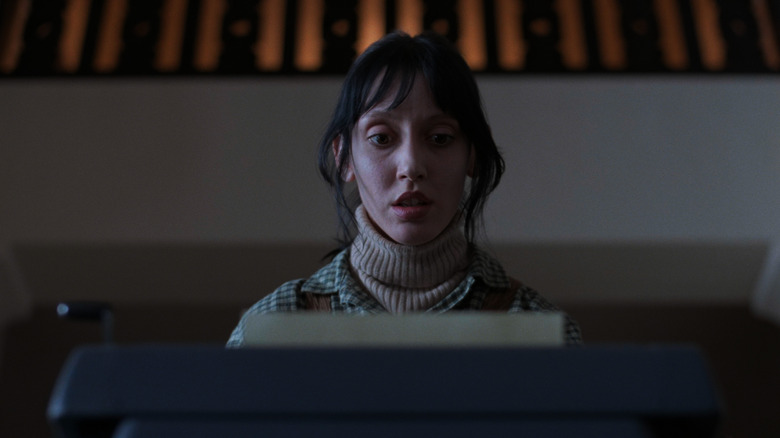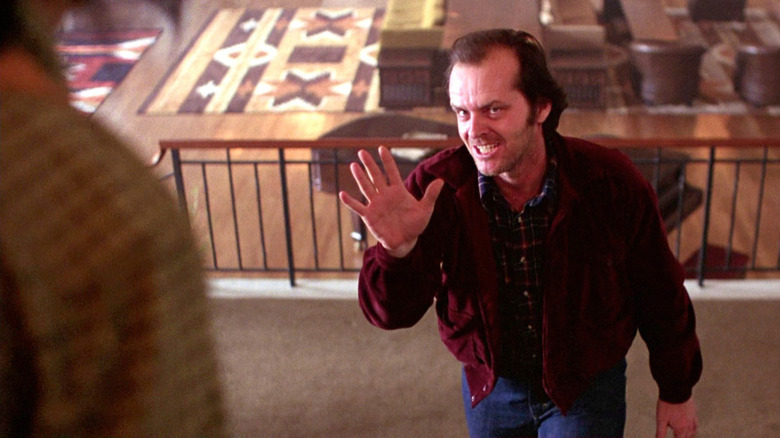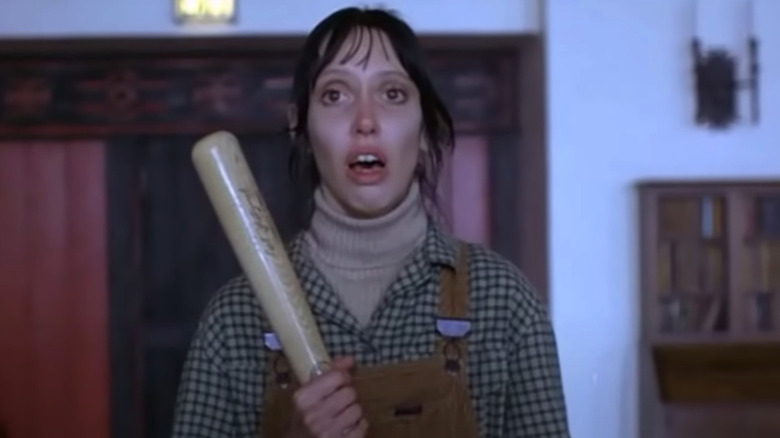One Of The Shining's Hardest Scenes Took Over 100 Takes To Get Right
There are demanding directors, and then there's Stanley Kubrick. He was notoriously picky about his work, pushing his actors through take after take in the name of perfection. This meant that whatever ended up on the screen eventually was his ideal vision and often it was some truly brilliant stuff — but at what cost? It's one thing to want your work to be its best possible version but another entirely to basically torture people to make that happen. Kubrick was especially challenging to work with on his 1980 horror film "The Shining," based on the Stephen King novel of the same name, forcing stars Jack Nicholson and Shelley Duvall through all kinds of misery in the name of his nightmarish epic. He was tough on Nicholson, putting the actor through at least 60 takes for an 8-minute sequence in a bathroom, but he was much harder on Duvall, abusing her verbally in order to break her down psychologically in an attempt to get a more intense performance out of her. Her time working on "The Shining" with Kubrick left Duvall changed forever, and it wasn't just Kubrick's belittling and unfair criticism that did it.
In an interview with Yahoo! News in 2021, Duvall spoke about her difficult experiences filming "The Shining" and revealed her feelings around one pivotal scene in the film that Kubrick forced both her and Nicholson to shoot 127 times. That's a whole lot of takes, even for Kubrick.
Up the stairs again and again
During the interview, Duvall was shown scenes from "The Shining," including one where her husband Jack (Nicholson) follows her up a staircase while she clings to a baseball bat for safety and tries to swing it at him. Nicholson is absolutely unhinged in the scene, and there's no doubt that Jack means to do his wife Wendy (Duvall) serious harm. They ended up shooting the scene 127 times, which is a lot for any scene, let alone one in which Duvall had to act as if she was in fear for her life. She had complicated feelings on the scene, explaining her tears by saying:
"Because we filmed that for about three weeks. Every day. It was very hard. Jack was so good – so damn scary. I can only imagine how many women go through this kind of thing. It was a difficult scene, but it turned out to be one of the best in the film."
Three weeks of pretending to be absolutely terrified is going to take its toll on a person, no matter how much Duvall tries to spin it into something positive by saying that the scene turned out to be one of the best in the film. Acting is pretend, of course, but even mimicking the reactions our body goes through in times of trauma can leave its mark, like Daniel Day-Lewis struggling with his mental health because of "The Last of the Mohicans" or Florence Pugh going through real trauma on "Midsommar." So it's tough to even imagine what three weeks at that level of intensity might feel like.
A performance driven by real fear
Duvall's performance in "The Shining" is powerful, but it also isn't entirely acting because she was being traumatized for real. While there are plenty of actors who revel in torturing themselves in the name of their art, being forced into that position by someone with authority over you (in this case, Kubrick) is truly awful. It might have been frustrating for Nicholson to repeat the same scenes over and over again, but he wasn't portraying someone in a state of intense fear and suffering, which has a profoundly different effect on the psyche.
"The Shining" is a masterpiece of filmmaking that is rightfully beloved by horror fans and more mainstream film fans alike, but only Duvall could really say whether or not it was all worth it in the end. 127 takes? Really?


